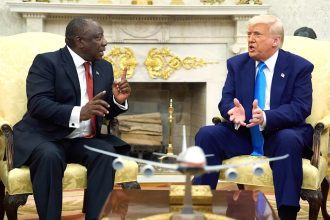The Trump administration has remade the Republican Party in countless ways. Few behind-the-scenes players exemplify the transformation quite like Michael Needham.
A decade ago, Needham was an insurgent, Tea Party firebrand and thorn in the side of establishment Republicans like Sen. Mitch McConnell (R-Ky.) and Jim DeMint, the former South Carolina senator and leading Tea Party figure. Today he’s remade himself as the policy fixer for Marco Rubio’s State Department, translating Trump-era nationalism into U.S. foreign policy. His rise from movement agitator to the secretary’s top strategist shows how deeply the MAGA worldview has permeated Republican diplomacy.
Officially, Needham is counselor and director of the secretary’s policy planning staff; unofficially, he is the implementer-in-chief of a muscular foreign policy that is reasserting itself in Latin America and has used State Department powers to enforce MAGA principles at home, according to interviews with five people close to Rubio and Needham.
“Marco had a clear vision of where he wanted to go, and then Mike was the implementer of that vision,” said a long-time former staffer of Rubio.
Needham and the State Department declined to comment.
Rubio and Needham speak nearly daily, according to people close to both men, who like others in this article were granted anonymity to speak freely about sensitive information at the agency. It’s an unusually close relationship between a secretary of state and his top aide.
Needham effectively acts as Rubio’s chief policy filter, surfacing America First proposals that blend ideology with implementation – for instance, visa bans targeting Chinese Communist Party-linked tech figures, curbs on illegal immigration and efforts to pressure Latin American governments viewed as undermining U.S. interests.
Oren Cass, founder and chief economist at conservative think tank American Compass, and a friend of Needham’s dating back to their days at Williams College, told POLITICO that he’s “sure” Needham has had an influence on Rubio’s ideas on China, and that the secretary has “enormous respect” for his long-time staffer, who’s a “substantive thinker on a lot of these issues.” He added that Rubio has a lot of the same thinking as Needham, both on China and on economic issues, and that the secretary is the driver and decision maker.
A person close to the secretary described Needham as a fact-finder who presents Rubio with options “that may not be in the conventional thinking.”
Needham’s unorthodox approach has earned him enemies over the years, particularly from DeMint allies and acolytes, who accused the sharp-elbowed insurgent of laying the groundwork for the former senator’s ouster from The Heritage Foundation, a conservative think tank. At the time Needham allies said DeMint was a disappointing steward but denied he was behind any plot.
The split-screen view was a common theme. Hard right conservatives, ascendent in the Tea Party era, viewed Needham as a leading thinker and an excellent articulator of conservative doctrine. More establishment Republicans widely disliked Needham and felt Heritage Action for America, an arm of The Heritage Foundation focused on electing Republicans, where he worked, too often aimed its fire at them instead of Democrats.
DeMint did not respond to a request for comment.
Among the efforts Heritage Action helped torpedo was a 2013 Senate bill that would have provided a pathway for citizenship for unauthorized immigrants, sponsored by Rubio. That same year, Needham was a key driver in pushing Republicans to force a government shutdown in an ultimately-doomed effort to kill Obamacare. The effort earned enmity from Republican leadership at the time with then-Speaker John Boehner, who said Heritage Action had “lost all credibility.” Needham was also a prominent critic of the Republican effort to replace Obamacare in 2017, saying it wasn’t conservative enough and calling it “bad politics” and “bad policy.”
While the pain points are different today, the split-screen remains. Trump’s foreign policy – particularly his hawkish stance on China – is mostly well received inside the GOP. But there are many prominent conservatives who have raised concerns about the administration’s interventionalism, whether it’s bombing Iran or expanding a military presence in the Caribbean.
“The thing in Venezuela, the hemispheric defense, the focus on Latin America, it ought to be quickly brought to a head, if you can negotiate something with these guys or not,” Bannon told POLITICO.
A China hawk and anti-immigration advocate, Needham has helped steer Rubio’s State Department toward a distinctly nationalist worldview.
In a July 2025 speech explaining the State Department’s switch to focusing on the Western Hemisphere, Needham argued that America’s “peaceful and prosperous future will not come from factories in China, but from those here in our hemisphere,” a line that describes the department’s renewed focus on Latin America.
He has also pressed the case that immigration is as much a cultural issue as an economic one, warning in a 2024 post that large immigrant inflows risk eroding jobs as well as “our national mores and our ability to provide dignity and basic services to our citizens.”
While secretaries have principles they discuss policies with, the Needham-Rubio relationship is “unique” in the amount of collaboration stemming from years of trust, according to the person close to Needham.
Rubio hired Needham as his chief of staff in 2018, when the Florida senator was still navigating where he fit inside a MAGA-fied Republican Party that had summarily rejected his run for president two years earlier.
Needham, who supported Sen. Ted Cruz (R-Texas) over Trump in 2016, was at the time CEO of Heritage Action and helped Rubio fit his foreign policy vision into Trump’s Republican Party.
“I think it was a very conscious decision on Rubio’s part,” to pick Needham to join his team in 2018, said Ryan P. Williams, president of The Claremont Institute, a conservative think tank, who knew Needham when he was a Lincoln fellow in 2013, a program for young professionals that focuses on the founders of the U.S. in policy planning.
“I think [Rubio] wanted to choose a chief of staff that could help advise him and would be a signal that he was maybe stepping back from some of his previously held positions especially on immigration,” he added.
Rubio and Needham “collaborate very effectively” in a way that only works if neither the secretary or the staff is simply committed to presenting talking points, Cass said, adding that it is in a way that has “empowered Rubio to be a leader on so many of these issues.”
Needham left Rubio’s Senate staff in 2023 to start America 2100, a think tank he told RealClearPolitics was meant to codify and institutionalize Rubio’s policy ideas. The organization became one of Washington’s most aggressive China hawk groups. Its website declares that, rather than allowing Beijing to create “unproductive monopolies” and establish “autocratic regimes in the ashes of peaceful territories,” the U.S. should rally “like-minded states” and refocus capitalism’s productivity on its own hemisphere.
Michael Sobolik, a senior fellow at Hudson Institute focused on U.S.-China relations, said Needham’s China policies are “more confrontational” than most.
“I remember being in the middle of a number of China policy debates a few years ago and and seeing America 2100 pretty intentionally insert itself into those debates and try to move policymakers in a more confrontational policy direction towards the Chinese Communist Party, which which I think was a good thing,” Sobolik said.
With Rubio likely to play a leading role in the administration for some time, Needham allies are confident he, too, will remain influential.
“Mike is someone who will certainly be a really important figure on the right of center in Republican politics and the conservative movement for what is going to be a very interesting and formative period for it in the coming years,” Cass said.









